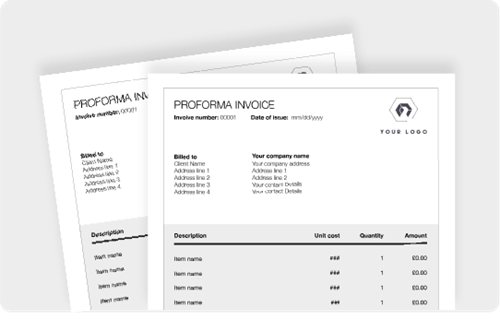Proforma Invoices
A proforma (also written as pro forma) invoice can be a useful tool for sellers and businesses. But when to use one, how it differs to a normal invoice and what its benefits are can be unclear. Read on for our comprehensive guide to proforma invoices and find out how they can help your business.
Quick Links:
> What is a proforma invoice?
> When is a proforma invoice issued?
> Why issue a proforma invoice?
> What is the difference between an invoice and a proforma invoice?
> Is there a difference between a proforma invoice and a quote?
> What should be included in a proforma invoice?
> Proforma invoice template
> 5 tips about proforma invoices


What is a proforma invoice?
A proforma invoice is a preliminary or estimated invoice, created and sent by a business to outline their intent to deliver goods or services to a customer.
Proforma invoices usually include a price quote, information on how to make payment and other details about the transaction. They sometimes follow or accompany quotes or estimates for work.
When is a proforma invoice issued?
A proforma invoice is usually created and sent when a customer or buyer has committed to a purchase, but before the goods or services have been delivered. In other words, proforma invoices are issued before a sale has been finalised or payment is required.
They are commonly used when payment is needed in advance and/or when the chance of a sale is likely.


Why issue a proforma invoice?
If the products or services are still being agreed on and the sale is not yet finalised, a proforma invoice can be used to represent the commitment, but in a format that can be amended or adjusted by either party where needed.
Therefore, proforma invoices can be useful when a less formal document – such as a delivery note – is not enough, but when it’s too early in the process to issue an official invoice.
They can also help businesses get paid quicker, as they give more notice to customers or buyers about how much they are going to owe you, so they can make necessary arrangements to pay.
What is the difference between an invoice and a proforma invoice?
A proforma invoice can be used to start a sale, while an invoice is used to confirm it. Invoices and proforma invoices have different purposes and are generated at different stages in the purchase journey.
Another difference between the two is that a proforma invoice provides the seller and the customer with a breakdown of the goods or services involved, but isn’t a legally binding document like an invoice is.
Proformas are often requested by the buyer or customer to help them decide whether or not to commit to the sale. They can also be used as a basis for negotiating the details of the sale.
Invoices, on the other hand, are essentially a bill that a seller will send to a buyer or customer to obtain payment for goods or services already committed to. They inform the buyer that payment is now due.
A proforma invoice needs to clearly state that it’s a proforma invoice, not an invoice.


Is there a difference between a proforma invoice and a quote?
Not a big one. They’re usually issued at the same stage in a purchase journey and perform similar functions. Neither is legally binding and they both provide information about the goods or services being sold. The terms are often used interchangeably to describe the same thing.
The only real difference is that quotes are sometimes issued slightly earlier in the sales process, when there’s less commitment from the buyer or customer (or none at all yet).
Quotes can easily be accepted or rejected by a customer, and won’t necessarily include the level of detail that proforma invoices do. This is why proforma invoices are sometimes seen as more of a commitment than quotes.
What should be included in a proforma invoice?
Proforma invoices often look very similar to regular invoices. Generally speaking, they should include the following:
- Seller’s contact details
- Buyer or customer’s contact details
- Date of issue
- Description of the goods and services to be provided
- Subtotal
- VAT (if applicable)
- Deductions (if any)
- Total
- Payment details
- Terms and conditions


Proforma invoice template
Want to make sure you’re including all the proforma invoice essentials? Download our free PDF proforma invoice template now.
5 tips about proforma invoices
1. Proforma invoices don’t have invoice numbers
Proforma invoices shouldn’t include invoice numbers. Only legally binding invoices require a unique invoice number; it’s one of the elements that gives them legal or financial value. Once a proforma invoice is finalised, a completed invoice – with an invoice number – should be created.
2. A proforma invoice isn’t legally binding
A customer or buyer is not legally bound to pay a proforma invoice. At this stage, there’s still room for both parties to negotiate. That’s why, once the transaction is confirmed, the seller should issue an official, final invoice.
3. You don’t have to pay a proforma invoice
A customer or buyer is not legally bound to pay a proforma invoice. At this stage, there’s still room for both parties to negotiate. That’s why, once the transaction is confirmed, the seller should issue an official, final invoice.
4. You can’t claim VAT using a proforma invoice
According to HMRC, customers can’t reclaim VAT using a proforma invoice. Proforma invoices can and do often show VAT, but to claim VAT, a buyer needs a full, finalised VAT invoice.
5. Proforma invoices don’t need to be cancelled
Proforma invoices aren’t official, legally binding invoices. So if they are no longer required or the sale falls through, they don’t need to be amended or cancelled.
Want to find out more about proforma invoices and how they can help your business? Get in touch with Handepay today. Don’t forget, you can also download our free PDF proforma invoice template.
Would you like
a callback?
FIND OUT MORE
Talk to an advisor today...

